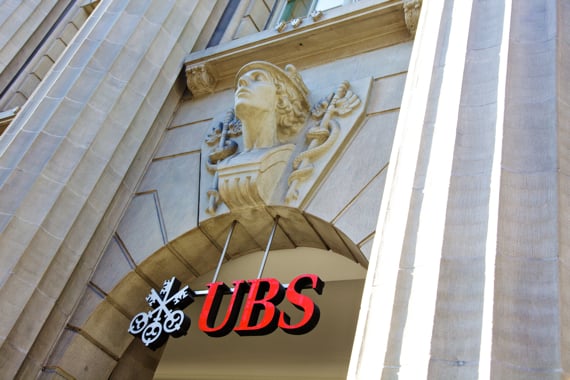Call it a signal of distress. Oswald Gruebel, boss of UBS AG, plans on eliminating 5.3% of the bank's workforce. This comes on top of scrapping the Swiss giant's profit targets. Both the wealth management group and wealth management Americas will feel the pinch.
UBS AG (UBSN), Switzerland's biggest bank, will eliminate about 3,500 jobs, or 5.3 percent of the workforce, as stricter capital requirements and a slowdown in client trading reduce earnings.
About 45 percent of the reductions will come from the investment bank, 35 percent from the wealth management and Swiss bank division and 10 percent each from the asset management and wealth management Americas units, the Zurich-based bank said in a statement today. UBS had 65,707 employees at the end of June.
Chief Executive Officer Oswald Gruebel aims to reduce annual costs by 2 billion Swiss francs ($2.5 billion) by the end of 2013 after scrapping the bank's profit target. The 50 largest banks around the world announced almost 60,000 job reductions this year through the first week of August, the fastest rate since 2008, data compiled by Bloomberg show. Credit Suisse Group AG (CSGN) said last month it will cut about 2,000 jobs, or 4 percent of staff, to help save 1 billion francs in annual costs beginning next year.
“UBS realized that despite expansion after the credit crisis they lost market share everywhere, and in investment banking they won't get back to where they once were,” said Dirk Becker, a Frankfurt-based analyst at Kepler Capital Markets, who has a “hold” rating on the company. “UBS will probably drop out from the bulge-bracket investment banks sooner or later.”
UBS rose 27 centimes, or 2.6 percent, to 10.80 francs by 10:45 a.m. in Swiss trading, trimming its loss this year to 30 percent. That matches the 2011 decline in the 46-company Bloomberg Europe Banks and Financial Services Index.
Stalling Growth
The company had announced about 18,500 job cuts during the credit crisis, which resulted in more than $58 billion of writedowns and credit losses for the bank and the biggest annual loss in Swiss corporate history in 2008.
“UBS will continue to be vigilant in managing its cost base while remaining committed to investing in growth areas,” the bank said in the statement. It expects to book restructuring charges of about 550 million francs, including about 450 million francs this year, mostly in the third quarter.
UBS's profit dropped 49 percent in the second quarter on a slump in earnings at the investment bank. The job reductions will affect almost 9 percent of 17,776 employees at the unit, based on headcount at the end of June.
“It is clear to us that the new capital and regulatory requirements will weigh on banking profits going forward,” Gruebel, 67, said at a press conference in Zurich last month. “This is a constraint for the entire banking industry, and we cannot rely on markets to boost our profits when global economic growth looks as if it may have stalled.”
Two-Year Effort
UBS had been aiming to double pretax profit to about 15 billion francs by 2014 from 7.46 billion francs in 2010. The bank abandoned the earnings goal on July 26 and said it will give an update on its targets in November.
UBS earnings have been hurt as the global economic recovery faltered, Europe's sovereign debt crisis intensified and the Swiss franc climbed to records against the dollar and euro. The Bloomberg European bank index dropped 20 percent since the start of August to the lowest level since March 2009.
Gruebel and Carsten Kengeter, 44, who runs the investment bank, have been trying to revive earnings at the division for two years. They hired more than 1,700 people across the investment bank and brought in new business heads to replace those that left or were fired. They've also increased risk- taking to improve earnings opportunities.
Market Share
The measures have brought limited benefits. UBS's share among the nine biggest investment banks of revenue from trading stocks and bonds and advising clients on capital-market transactions and mergers more than doubled from 2009 to the first half of this year, yet it remained the lowest.
UBS said the client and investment advisory businesses in Switzerland will be largely unaffected by the job cuts. In total about 400 reductions are planned in the country, mostly in central services and administrative units, it said.
Job cuts will affect about 4.4 percent of staff at the wealth management and Swiss bank division, 9.2 percent in asset management and 2.2 percent in wealth management Americas. Cost-cutting measures will also include some changes in the use of real estate, the bank said without elaborating.
--Bloomberg News--







